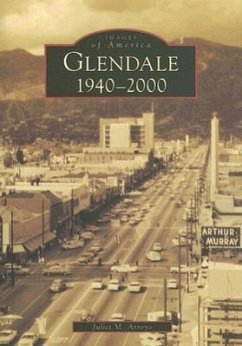The Second World War changed Glendale in the same way that it overhauled many cities in Southern California, with new war-related industries requiring more workers in bigger facilities. Many men and women of the armed forces decided to make Glendale their home after the war. The population stabilized in the 1960s, but a new wave of development swept through Glendale as it became surrounded by freeways, as the Galleria mall was built, and as Brand Boulevard became a center of commerce. The city's cultural composition also changed when more Latinos, Armenians, Asians, and other distinct peoples began to make Glendale home, boosting Los Angeles County's third most populous city over the 200,000 brink. The year 2006 marked the city's centennial and the bicentennial of Jose Maria Verdugo's Rancho San Rafael, from which the city grew.
Bitte wählen Sie Ihr Anliegen aus.
Rechnungen
Retourenschein anfordern
Bestellstatus
Storno

